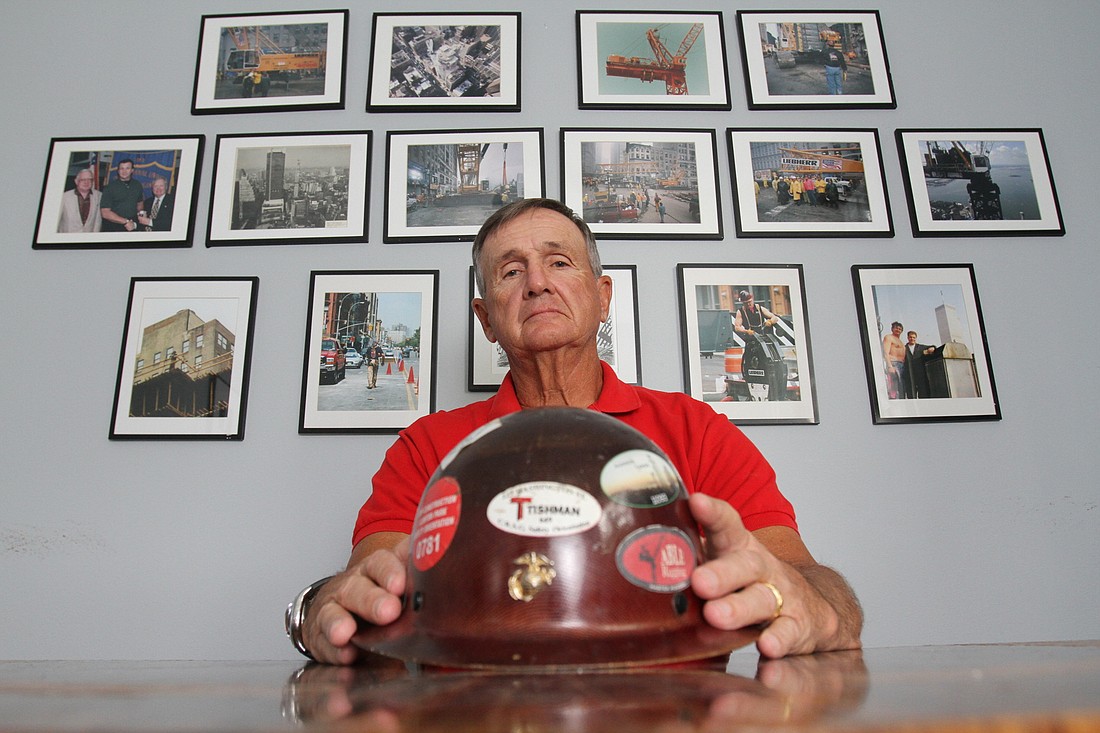- January 7, 2025
-
-
Loading

Loading

Vincent Billi remembers the moment he realized something was wrong.
He and his wife Lynn were on their way into the city early in the morning when he took a phone call on the train.
“(My friend says) ‘Where are you? A plane just came down Sixth Avenue,’” he said. “As we keep going, we can see a building burning … and everyone’s phones just start going off.”
Sept. 11 was the start of days of dangerous work and heartache for Billi, now an Osprey resident.
Billi, 74, was an engineer who worked on tower cranes in New York. Before retiring, he spent 45 years learning about the design intricacies of skyscrapers and buildings.
On the day the towers fell, Billi helped out from the ground. Upon learning a plane had struck the World Trade Center — a woman ran by him and his wife at Penn Station screaming about the attack and how the Pentagon was next — Billi broke off to head towards the towers to help.
He said it was still too early to know everything that was happening but there was damage and debris that needed removal, and Billi knew how to direct engineer teams and crane operators. Billi had spent decades working with the crane and construction companies and was a well-known member of the local union.
He met with some fellow crew members and first responders at Chambers Street close to the World Trade Center and waited for the go ahead. Both towers had fallen and the World Trade Center 7 building was burning and close to collapsing.
He remembers his people and first responders feeling anxious and frustrated.
“You wanted to go and save them, you wanted to help them,” Billi said. “There was nothing you could do. You could only try to do the best you can with what you knew how to do.”
Billi went to 1 Police Plaza to connect with crane companies and determine what kind of machinery could be brought in to help with the rescue. He eventually doubled back to Ground Zero that evening to help with the rescue effort himself.
“When Seven (World Trade Center) fell, we went in,” Billi said. “When engineers come in, there’s usually a foreman … there wasn’t a foreman that day but they all knew me.”
It was dangerous from the start. The engineers didn’t have larger cranes at first to move big pieces of steel that first night so smaller truck cranes worked alongside people in a bucket brigade to get small pieces of steel and debris out.
Firefighters led the way, carefully inching into the debris and checking for hidden voids that people could fall into.
All the while, Billi and the workers listened for sounds of survivors. He was doubtful they’d find any because of underground fires, the heat of which he could feel from below.
Later on, Billi started hearing what seemed like crickets.
“All the firemen had these lights on them and if they had gone down (or been injured or died), it sounded like a cricket,” Billi said. “You could hear that all over. We didn’t know what it was at the time but found out later.”
Lynn Billi stayed with a friend in the city. She remembers hearing fighter jets overhead.
She was worried sick but eventually heard from Billi around noon the next day. He was coming home on the train but he needed a new set of clothes from top to bottom — she quickly understood why.
“I remember he had this smell like earth, fire and smoke,” Lynn Billi said. “He was black. He was (covered) in soot.”
Billi slept with his wife for a few hours and says it was in those moments that the gravity of what he’d seen had hit him.
“I said (Lynn), there’s a lot of dead people here,” Billi said.
He was back up the next day to continue working at the site with his crew, this time clearing streets to erect and operate the larger cranes. That was dangerous in its own right. Between the heat below and the instability of the street area, Billi said he and other operators were on edge.
They’d work 12 hour shifts clearing larger amounts of debris for the firefighter to keep pressing in and searching for survivors.
At one point Billi and other workers slept in a high school to be close to the site. He remembers being served food by volunteers, one of whom was actor Tim Robbins.
A few days later, the chaos subsided and Billi was no longer needed to help at the site. At that point all he and his wife could do was work through the pain of who they’d lost.
Billi knows with complete certainty that he and his fellow workers made a difference. But it’s the legacy of Sept. 11 with which Billi has struggled.
After seeing so much death that day, he finds it hard to accept much of what came after was a prolonged war in the Middle East that claimed the lives of so many others.
“I didn’t need a 20-year war after, I’ll tell you that much,” Billi said. “It upsets me a great deal. I think about (the guys) coming back banged up, it just didn’t make sense.”
Years later, Billi returned to the location to see the One World Trade Center built where the towers once stood. He appreciated how sturdily it was constructed and how it recognized all those who had sacrificed their health and lives to save others.
It makes him think of the community he and the many volunteers and workers had during those days.
“We gave whatever we could,” Billi said. “We were together and we were going to do our best.”